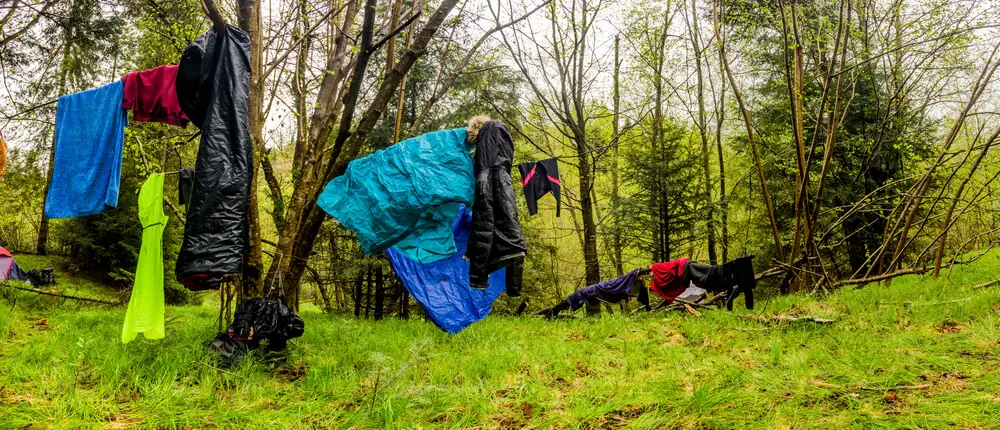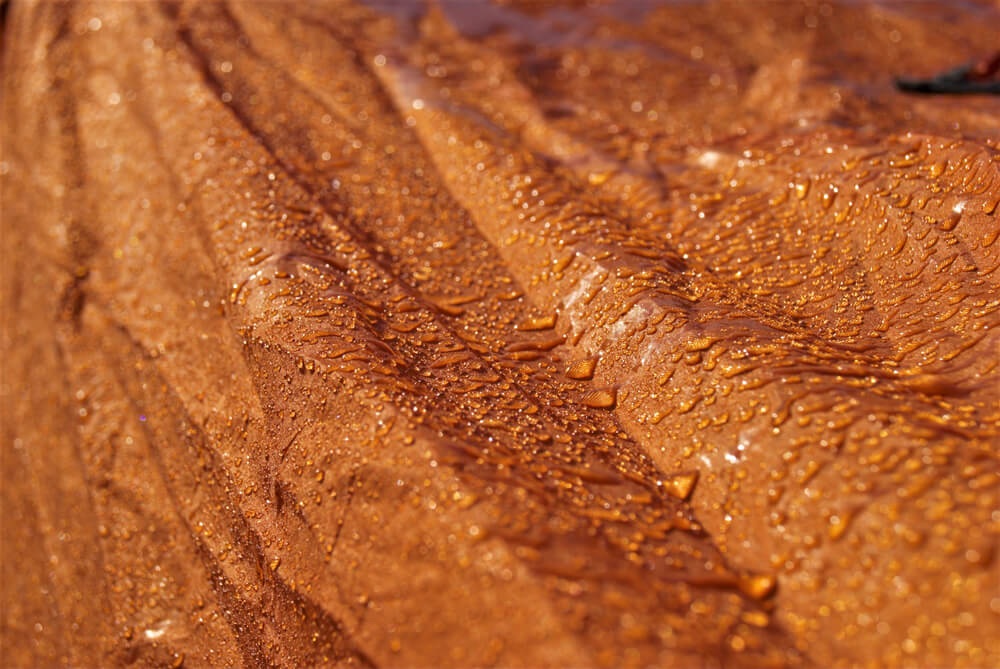Truth be told, if you enjoy camping, then you are well aware that the elements do not care about the condition of your tent. Usually, it has to withstand inclement weather, and this is where your tent can get pretty filthy. Dirt and dust are all culprits, and they can end up on the outside and inside of your tent.
Not only are breathtaking sights present on mountaintops, but there is also rain, bugs, sticks, mud, and other kinds of debris that can soil the outside and even the inside of your tent when you track it in.
Even the beach has sand that can collect inside of your tent along with the wet seawater, which can cause a long-lasting stench.
In other words, tents are highly susceptible to dirt, and if your tent is dirty, you have to clean it. That begs the question, "Can you wash a tent in the washing machine?"
Let's weigh the risks of doing so.
More...
Table of Contents
Is It Safe to Wash a Tent in the Washing Machine?
Tents should not be placed in the washing machine because the force inside the machine is too harsh for the tent. More specifically, you could damage the tent's mesh, coating, and seams.
Why You Shouldn’t Wash Your Tent in The Washing Machine
Tents are resilient and durable enough to stand up to the rain, the snow, the wind, and even an unforgiving sun. That does not mean that it is robust enough to survive in a thrashing washing machine for what amounts to about an hour.
Tents are lightweight shelters defined by their portability. However, the attributes that allow it to perform its job well do not bode well when thrown inside of a washing machine.
The seams of the tent are likely to be damaged in a rough and tumble washing machine. Even if you were to adjust the setting to a gentle cycle, in most cases, this would be enough to mitigate the potential damage.
The seams are also called seam taping and seal up small holes that form when different layers of the tent get sewn together. If damage happens to the seam taping or it ultimately comes off inside the washing machine, your tent will be incapable of keeping water out when it rains.
If this is the case, then your tent becomes useless. Due to the natural unpredictability of weather, you will be at the mercy of any incoming rain. And with a single shower, your camping trip is ruined, and all of your belongings are wet.
Likewise, the mesh on your tent is responsible for proper air ventilation and airflow within the tent. Typically this is the most delicate portion of the tent. The material will likely break inside of the machine causing large holes to form in the mesh.
At this point, the tent will be useless because there will be a freeway there for bugs to take straight into your tent at any time they please. Additionally, it is aesthetically unappealing.
The coating is an essential part of the tent as well. It is susceptible to getting damaged by the washing machine. The waterproof layer is what keeps the tent from being drenched in water. It is indisputably the most crucial design of the tent.
The spinning forces of your washing machine could crack and compromise the coating, obliterating this feature.
So long story short, throwing your tent in the washing machine is a bad idea on many levels. Although the washing machine's cycles are way too violent for the tent to endure, you can clean your tent using the old-fashioned method.

How to Properly Wash Your Tent?
As you can see, there are ways to go wrong when washing your tent. Luckily, we've put together all of the proper techniques and steps that go into cleaning your tent without incident.
Wash It Inside in a Bathtub With a Sponge
Before introducing water to the mix, begin by simply vacuuming and cleaning out your tent. Next, wet or spray all parts of the tent with water. Then, put some soap on a sponge and wash every area of the tent with a sponge.
Lastly, rinse all of the soap residues off in the tub and find somewhere for it to dry. It is harmless to leave the tent in the sun for a small to dry, but too much exposure to UV rays from the sun can be detrimental to tents.
Clotheslines are ideal when trying to dry a tent. However, you can drape it over a wall or a chair, and it will dry all the same. Be sure not to put the tent on a surface that's rough or sharp where snagging is possible. Once you've dried your tent, you can store it as you usually would.
Go Outside With a Hose and a Sponge
This method is essentially the same as the method used in the shower, except, in this case, you're outside and using a hose.
Begin this process the same as the shower method; clean out the inside of your tent by sweeping or vacuuming it. Spray the entire tent down until it is saturated. Then, grab a sponge and apply some soap to it and wash every section of the tent.
Rinse the soap off using the hose and then take it to a designated place for drying. Again, you can leave the tent in the sun for a little while but not for too long, or you risk damaging it because of the sun's UV rays.
Again a clothesline would be ideal for drying your tent, but draping it over a wall or a chair will get the job done all the same. Remember to avoid placing your tent on rough or sharp surfaces. Once it's dry, store it as you usually would.
Other Options for Vinyl Tents
Below are other cleaning options for vinyl tents.
Buffer or Floor Polisher Use
For these older tents, some people use a rotary buffer to clean their tents. Ensure that the rotary buffer you use is a small buffer with a 12" to 17" base. If there is a floor pad, use a white pad for newer tents, and a red pad as the tent begins aging.
When using a buffer, be careful around the scallops, rope rigging, and the edges so that the machine doesn't rip the tent. The brush is the best option for cleaning the flaps and the edges which form in the middle from laying the tent down flat.
Pressure Washer
There are a lot of tent owners that choose to use the pressure washer to clean their tents.
The best PSI is between 1000-1500. This machine is perfect for spraying your tent cleaner directly into the fabric of the tent while dry. You can also use it to rinse the tent once you have finished cleaning it.
Make sure you're not too close to the surface of the tent; you should be at least two feet away.
It's beneficial to use the pressure washer to keep the stitching on the tent white.
For optimal results, you should use a tent cleaner beforehand and saturate the fabric all around.
Bleach
It may be necessary to use household bleach if you see mildew stains on your tent. Remember to dilute the solution 1 to 10 using water. Apply this mixture to the tent before it's wet.
Let the bleach stay on the stains for a few minutes before you rinse it off. Remember that mixing bleach with other chemicals can produce deadly, odorless, invisible fumes that could harm you or others in the vicinity.
Bleach can also cause rot on the stitches. Natural fabric fibers on the tent are susceptible to rotting.

How Often Should You Wash Your Tent?
There's no specific rule as to how often you should be washing your tent. Different people use their tents at different rates. Therefore, you should wash the tent as you deem necessary.
For example, if you camp out often, your tent gets exposed to the elements more frequently than someone that goes camping occasionally.
The mud, dirt, and debris can do a number on your tent if you don't clean it often enough.
Typically, each time you take your tent out, you should clean it. Remove everything that was inside before you put it up. That keeps foreign objects from damaging your tent while it's stored.
An example of this would be hunting knives or other objects that could potentially rip the fabric or spill and stain it.
Clean the inside of the tent by clearing and dust, dirt, rocks, leaves, sand, and so on. This may include a quick sweeping with a broom and the dustpan, or you could ask for a hand from someone else. You two could flip it upside down and shake it out together.
Once you are finished cleaning the inside of the tent, try to scrape off any dirt or mud off the bottom. The bottom is likely the dirtiest section of your tent since it's always on the ground.
Get the big stuff if you can, and then roll or fold your tent up and store it until next time. If you can help it, make sure the bottom of your ten doesn't touch the other areas.
So, the takeaways here are to wash your tent as often as you feel it needs to be cleaned or if it has a nasty odor. You can clean it after each use to prolong its longevity, or you can clean it every few years if you don't use it often.
How to Properly Store Your Tent After Washing?
Storing your tent the correct way is almost as important as cleaning it regularly. Once you've washed it, you have to store it so that it doesn't get moldy or accumulate mildew. Never fold up and store a wet tent; always allow it to dry thoroughly.
If you're in a situation where you have to store it while wet - like if you're departing from the camping site after a rain - then do so. However, you should unfold it and let it air dry as soon as possible.
You should never store the tent in the bag that it came with. Those types of bags don't allow for any ventilation, which is detrimental to preserving your tent if you're letting it dry out.
Even if your tent is dry, there's no airflow in those bags. It's better to roll your tent up loosely if you have the space to place it somewhere.
If you're worried about covering it, you can use a towel or a blanket to keep it from getting dusty. Prevent mold and mildew by not making it susceptible to trapped moisture. If possible, always store your tent in the garage or house instead of outside.
You don't want the tent constantly exposed to the elements if you can help it. Store the poles along with the tent so that the shock cords inside don't endure additional tension.
Final Thoughts
So, can you wash a tent in the washing machine? It's not a good idea to throw your tent in the machine when it's time to clean it. Though tempting, you'll probably just damage the mesh, seams, and any waterproof coating.
Though it requires a bit of work, you can clean your tent with a sponge, hose and a bucket, or a pressure washer. You can do this inside or outside.
The fabric is durable so you don't necessarily have to wash your tent each time, although doing so will make it last longer. You can just as easily wait until you've used it and it's visibly really sorry or stained.
Your tent will last for years on end if you keep it cleaned adequately and stored correctly.
- Are Merrell Shoes Good? – An Unbiased Review of Merrell Footwear - December 9, 2023
- Where Are Merrell Shoes Made? - December 9, 2023
- Camping in 40-degree Weather: Tips and Tricks - September 25, 2023

![Can You Wash Uggs in the Washing Machine? [Complete Guide] Can You Wash Uggs in the Washing Machine? [Complete Guide]](https://grandcircletrails.com/wp-content/uploads/2022/10/Can-You-Wash-Uggs-in-the-Washing-Machine-150x150.jpg)

![Can You Use a Propane Heater in a Tent? [Is It Safe?] Can You Use a Propane Heater in a Tent? [Is It Safe?]](https://grandcircletrails.com/wp-content/uploads/2022/06/Can-You-Use-a-Propane-Heater-in-a-Tent-150x150.jpg)

![Can You Hike in Tevas? [Are Tevas Really Good For Hiking?] Can You Hike in Tevas? [Are Tevas Really Good For Hiking?]](https://grandcircletrails.com/wp-content/uploads/2022/05/Can-You-Hike-in-Tevas-1-150x150.jpeg)
